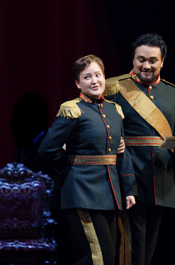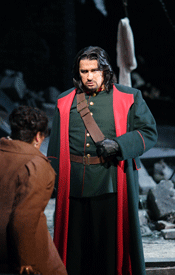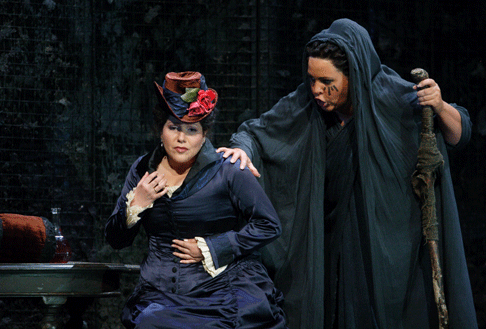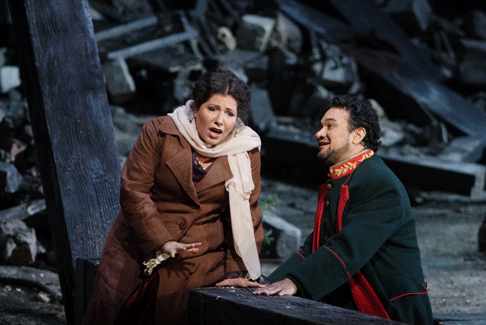![Ramón Vargas as Riccardo {Photo by Catherine Ashmore courtesy of The Royal Opera House]](http://www.operatoday.com/Vargas_Ballo_ROH_2.gif)
29 Jun 2009
Un ballo in maschera at Royal Opera House
On the whole, I’d prefer the conspirators to be sitting on toilets…
English Touring Opera are delighted to announce a season of lyric monodramas to tour nationally from October to December. The season features music for solo singer and piano by Argento, Britten, Tippett and Shostakovich with a bold and inventive approach to making opera during social distancing.
This tenth of ten Live from London concerts was in fact a recorded live performance from California. It was no less enjoyable for that, and it was also uplifting to learn that this wasn’t in fact the ‘last’ LfL event that we will be able to enjoy, courtesy of VOCES8 and their fellow vocal ensembles (more below …).
Ever since Wigmore Hall announced their superb series of autumn concerts, all streamed live and available free of charge, I’d been looking forward to this song recital by Ian Bostridge and Imogen Cooper.
The Sixteen continues its exploration of Henry Purcell’s Welcome Songs for Charles II. As with Robert King’s pioneering Purcell series begun over thirty years ago for Hyperion, Harry Christophers is recording two Welcome Songs per disc.
Although Stile Antico’s programme article for their Live from London recital introduced their selection from the many treasures of the English Renaissance in the context of the theological debates and upheavals of the Tudor and Elizabethan years, their performance was more evocative of private chamber music than of public liturgy.
In February this year, Albanian soprano Ermonela Jaho made a highly lauded debut recital at Wigmore Hall - a concert which both celebrated Opera Rara’s 50th anniversary and honoured the career of the Italian soprano Rosina Storchio (1872-1945), the star of verismo who created the title roles in Leoncavallo’s La bohème and Zazà, Mascagni’s Lodoletta and Puccini’s Madama Butterfly.
Evidently, face masks don’t stifle appreciative “Bravo!”s. And, reducing audience numbers doesn’t lower the volume of such acclamations. For, the audience at Wigmore Hall gave soprano Elizabeth Llewellyn and pianist Simon Lepper a greatly deserved warm reception and hearty response following this lunchtime recital of late-Romantic song.
Collapsology. Or, perhaps we should use the French word ‘Collapsologie’ because this is a transdisciplinary idea pretty much advocated by a series of French theorists - and apparently, mostly French theorists. It in essence focuses on the imminent collapse of modern society and all its layers - a series of escalating crises on a global scale: environmental, economic, geopolitical, governmental; the list is extensive.
For this week’s Live from London vocal recital we moved from the home of VOCES8, St Anne and St Agnes in the City of London, to Kings Place, where The Sixteen - who have been associate artists at the venue for some time - presented a programme of music and words bound together by the theme of ‘reflection’.
'Such is your divine Disposation that both you excellently understand, and royally entertaine the Exercise of Musicke.’
Amongst an avalanche of new Mahler recordings appearing at the moment (Das Lied von der Erde seems to be the most favoured, with three) this 1991 Mahler Second from the 2nd Kassel MahlerFest is one of the more interesting releases.
‘And there was war in heaven: Michael and his angels fought against the dragon; and the dragon fought and his angels, And prevailed not; neither was their place found any more in heaven … that old serpent … Satan, which deceiveth the whole world: he was cast out into the earth, and his angels were cast out with him.’
If there is one myth, it seems believed by some people today, that probably needs shattering it is that post-war recordings or performances of Wagner operas were always of exceptional quality. This 1949 Hamburg Tristan und Isolde is one of those recordings - though quite who is to blame for its many problems takes quite some unearthing.
There was never any doubt that the fifth of the twelve Met Stars Live in Concert broadcasts was going to be a palpably intense and vivid event, as well as a musically stunning and theatrically enervating experience.
‘Love’ was the theme for this Live from London performance by Apollo5. Given the complexity and diversity of that human emotion, and Apollo5’s reputation for versatility and diverse repertoire, ranging from Renaissance choral music to jazz, from contemporary classical works to popular song, it was no surprise that their programme spanned 500 years and several musical styles.
The Academy of St Martin in the Fields have titled their autumn series of eight concerts - which are taking place at 5pm and 7.30pm on two Saturdays each month at their home venue in Trafalgar Square, and being filmed for streaming the following Thursday - ‘re:connect’.
The London Symphony Orchestra opened their Autumn 2020 season with a homage to Oliver Knussen, who died at the age of 66 in July 2018. The programme traced a national musical lineage through the twentieth century, from Britten to Knussen, on to Mark-Anthony Turnage, and entwining the LSO and Rattle too.
With the Live from London digital vocal festival entering the second half of the series, the festival’s host, VOCES8, returned to their home at St Annes and St Agnes in the City of London to present a sequence of ‘Choral Dances’ - vocal music inspired by dance, embracing diverse genres from the Renaissance madrigal to swing jazz.
Just a few unison string wriggles from the opening of Mozart’s overture to Le nozze di Figaro are enough to make any opera-lover perch on the edge of their seat, in excited anticipation of the drama in music to come, so there could be no other curtain-raiser for this Gala Concert at the Royal Opera House, the latest instalment from ‘their House’ to ‘our houses’.
"Before the ending of the day, creator of all things, we pray that, with your accustomed mercy, you may watch over us."
![Ramón Vargas as Riccardo {Photo by Catherine Ashmore courtesy of The Royal Opera House]](http://www.operatoday.com/Vargas_Ballo_ROH_2.gif)
On the whole, I’d prefer the conspirators to be sitting on toilets…
No, really, ENO’s ‘controversial’ production of 2002 may have jarred with traditionalists but in many ways it made better sense than this revival of Mario Martone’s 2005 production. Martone is also a film director (cue groans from those who hated Kiarostami’s ‘Così’) and the opera is conceived as a series of tableaux, from the staid to the spectacular, but without much in the way of personenregie. The original production could boast of Mattila, Hampson and Álvarez in the leading roles, but for this revival the ROH have cast a house debutant soprano, the Chilean Angela Marambio, the Slovakian baritone Dalibor Jenis, and Ramón Vargas, and of the three it is only the tenor who produces a genuinely Verdian sound.
 Anna Christy as Oscar and Ramón Vargas as Riccardo
Anna Christy as Oscar and Ramón Vargas as Riccardo
I have to declare a preference for the Danish setting, with the venial King Gustavus biting the dust at the ball — it simply makes more sense to me, all the ‘American’ references in the Boston version sounding daft to my ears, and exactly which Massachusetts ‘castello’ did Riccardo appropriate from his enemy? Of course I’m aware of all the censorship shenanigans, but the story is quite ludicrous enough without adding on any extras. He loves her, but he has preserved her honour? Oh please. Renato entirely fails to recognize his own wife just because she dons a veil? Give me a break. These absurdities can of course be negated in a production which focuses on gripping the emotions and making sense of the politics, but this wasn’t it.
 Dalibor Jenis as Renato
Dalibor Jenis as Renato
Ramón Vargas is yet another of those tenors once tipped to be one of the ‘new Three Tenors’ (groan) but he has survived this nonsense and is actually a fine musician, with a fairly light, flexible voice which he uses with taste and discretion — he lacks the big bow-wow effect beloved of many admirers of this repertoire, but there is no shortage of italianità in the singing, even though ‘Di tu se fedele’ was a little breathy and ‘O qual soave’ was rather thin on passion — that however was not exactly his fault. He did his level best to make something of the role, not exactly helped by either the direction or the Amelia.
Not only do revivals always encourage comparison — and it’s unfortunate in this context that Mattila was such a sympathetic heroine last time around — but they can also suffer from lack of work on the interactions between the principals, something which especially affected Angela Marambio, whose Amelia could blossom if she were able to actually do something on stage other than emote. Her best singing came in ‘Morrò, ma prima in grazia’ where stand and deliver is allowable, but in the Act II duet and at the death scene, she was sorely in need of some direction.
 Angela Marambio as Amelia and Elena Manistina as Ulrica
Angela Marambio as Amelia and Elena Manistina as Ulrica
Dalibor Jenis has an imposing voice and stage presence, and he was often convincing as Renato, although I’m sure he would not be regarded as a genuine Verdi baritone by most aficionados of the breed. ‘Eri tu’ was however grippingly sung, in one of the few believable scenes of the evening. Elena Manistina was a sinister Ulrica, her cries about communing with Satan not once eliciting a chuckle from me — and that’s praise, by the way. Oscar is one of opera’s most irritating parts, but Anna Christy succeeded in not making me wince more than a couple of times — again, a compliment.
Orchestrally things were slow — very slow — although there was plenty of light and shade in Maurizio Benini’s conducting. In terms of the production, who would not love Sergio Tramonti’s wonderful design for the ball scene, with its framed image and brilliant use of mirrors? The only problem was that some of the characters did not quite seem to know what to do with themselves, even as their beloved ‘Governor’ was breathing his last. I liked Ulrica’s bear pit and the Act II gallows, although I imagine the latter was a trial for those who had to walk around in it. The other scenes were deeply conventional, as of course was the feel of the whole evening.
 Angela Marambio as Amelia and Ramón Vargas as Riccardo
Angela Marambio as Amelia and Ramón Vargas as Riccardo
This ‘Ballo’ comes after a starry ‘Traviata’ and before an equally name-laden ‘Barbiere’ so in a way it’s a kind of breathing space, and if you like your Verdi without too many directorial surprises and your singing and acting styles traditional, you’ll be pleased with this production — first night wobbles must have taken the edge off some of the phrasing, and I’m sure that later performances will find all three principals much more settled in.
Melanie Eskenazi